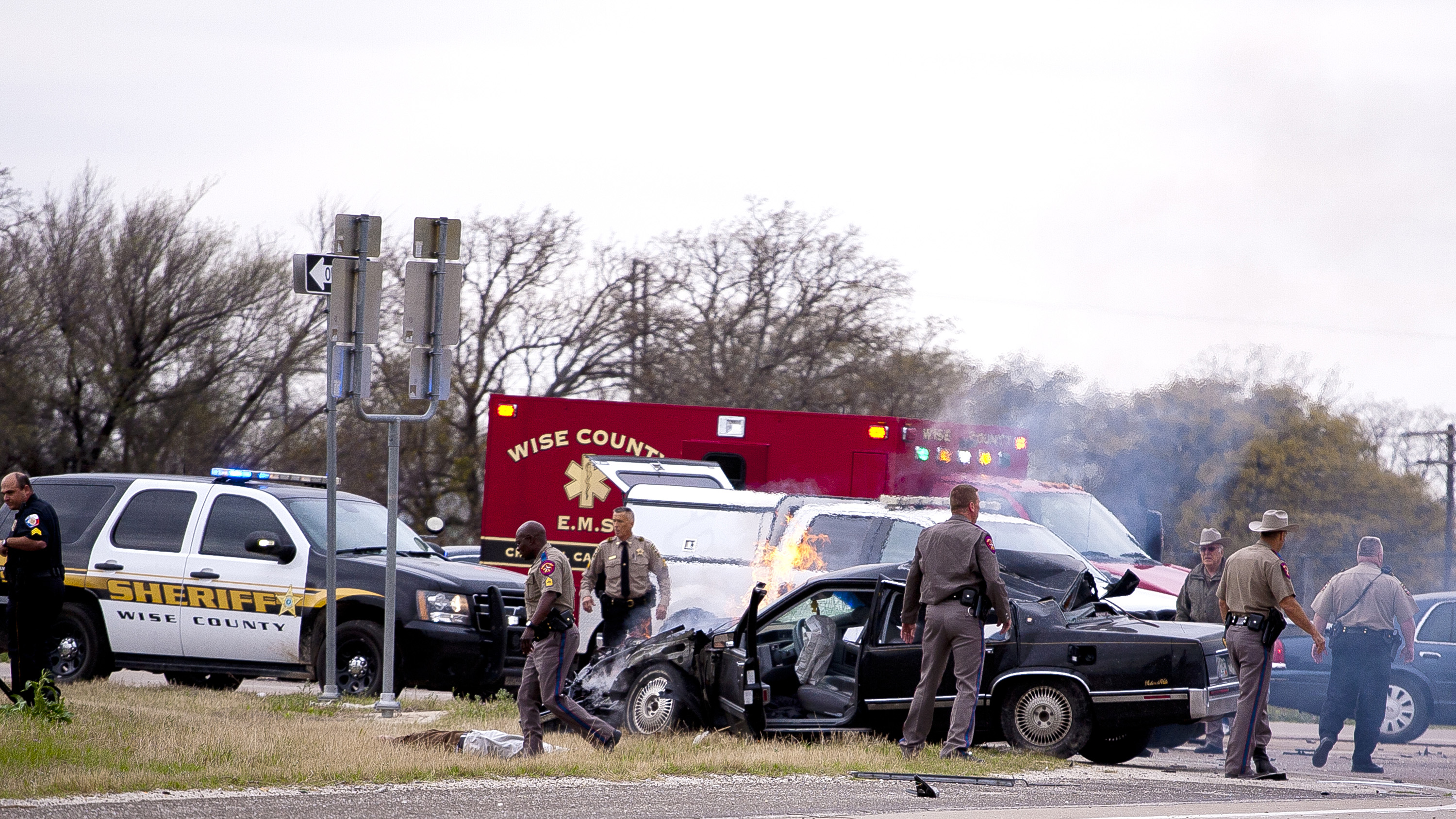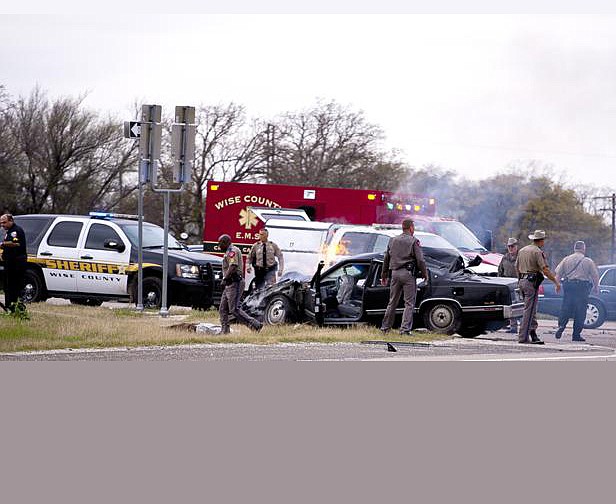 Emergency personnel are on the scene of a crash and shootout with police involving the driver of a black Cadillac with Colorado plates in Decatur, Texas, Thursday. The driver led police on a gunfire-filled chase through rural Montague County, crashed his car into a truck in Decatur, opened fire on authorities and was shot, officials said. Texas authorities are checking whether the Cadillac is the same car spotted near the home of Colorado prisons chief Tom Clements, who was shot and killed when he answered the door Tuesday night.
Emergency personnel are on the scene of a crash and shootout with police involving the driver of a black Cadillac with Colorado plates in Decatur, Texas, Thursday. The driver led police on a gunfire-filled chase through rural Montague County, crashed his car into a truck in Decatur, opened fire on authorities and was shot, officials said. Texas authorities are checking whether the Cadillac is the same car spotted near the home of Colorado prisons chief Tom Clements, who was shot and killed when he answered the door Tuesday night.DECATUR, Texas - The black 1991 Cadillac slammed into an 18-wheeler hauling gravel on a rural four-lane road in the North Texas prairie. Its driver, a Colorado parolee and member of a white supremacist prison gang, bailed out and opened fire on the deputies chasing him.
Evan Spencer Ebel, 28, was shot in the head and died.
From the wreckage comes a mix of clues and speculation that tie together two shocking Colorado killings and could shed new light on a third one in Texas.
Although Colorado authorities won't confirm Ebel's gang ties or say whether they have anything to do with the slaying of the state prisons chief, they've locked down prisons, where the white supremacist gang is active, and upped security on state officials.
They say both are general precautions.
The potential ties between Ebel and the slaying of corrections director Tom Clements, 58, became clearer on Friday. The shell casings Texas authorities collected after the shootout are similar to those found at Clements' home. And the Cadillac Ebel drove matched the description of one spotted in the neighborhood that night.
Then, in the trunk of Ebel's car, Texas authorities found a Domino's pizza box and a jacket or shirt from the popular chain. That hardened the apparent connection between Ebel and the slaying of deliveryman Nathan Leon, who delivered a pizza on Sunday and was found dead of multiple gunshot wounds.
The most tenuous connection is to another slaying, that of prosecutor Mark Hasse in rural Kaufman County, 100 miles east of the crash site. Hasse was gunned down as he walked through the courthouse parking lot the morning of Jan. 31. Authorities were already probing whether white supremacists assassinated Hasse.
Now they are starting to question the parallels between the Hasse case and the Clements slaying.
"Everybody is wondering, why did he run to Texas?" Kaufman County Dist. Atty. Mark McLelland said of Ebel in an interview. "Those things happen up there (in Colorado), and all of a sudden he's here where something like that already happened, your imagination runs wild."
A federal law enforcement official confirmed Ebel's white supremacist ties to The Associated Press on condition of anonymity, because he wasn't authorized to speak about the investigation.
The gang he's a member of is the 211s, one of the most vicious white supremacist groups operating in the nation's prisons, comparable to the Aryan Brotherhood of Texas, according to the Southern Poverty Law Center, which tracks extremist groups.
Founded in 1995 to protect white prisoners from attacks, it operates only in Colorado and has anywhere from between a couple hundred to 1,000 members, senior fellow Mark Potok said Friday.
The gang has grown into a sophisticated criminal enterprise where members are assigned military titles like "general" and extort money from fellow prisoners, regardless of race. Released members are expected to make money to support those still in prison, Potok said. He said members have to attack someone to get in and can only get out by dying.
"It's blood in and blood out," he said.
In 2005, 32 members were indicted for racketeering and the gang's founder, Benjamin Davis, was sentenced to over 100 years in prison.
Legal records show Ebel was convicted of several crimes in Colorado dating back to 2003, including punching a prison guard in 2008. He apparently was paroled, but Colorado Department of Corrections spokeswoman Alison Morgan said she could not release information on prisoners because of the ongoing investigation into Clements' death.
Scott Robinson, a criminal defense attorney and media legal analyst, represented Ebel in 2003 and 2004. He said Ebel had been sentenced to a halfway house for a robbery charge in 2003 before he was accused in two additional robbery cases the following year that garnered prison sentences of three and eight years.
"I thought he was a young man who was redeemable, otherwise I wouldn't have taken the case," Robinson said, saying he didn't recall the details of the case.
Robinson said he knew Ebel before he got in trouble. He said Ebel was raised by a single father and had a younger sister who died in a car accident years ago.
Vicky Bankey said Ebel was in his teens when she lived across from him in suburban Denver until his father moved a couple of years ago. She remembers seeing Ebel once jump off the roof of his house. "He was a handful. I'd see him do some pretty crazy things," she said.
"He had a hair-trigger temper as a kid. But his dad was so nice," Bankey said.
Ebel's father didn't return multiple phone calls.
